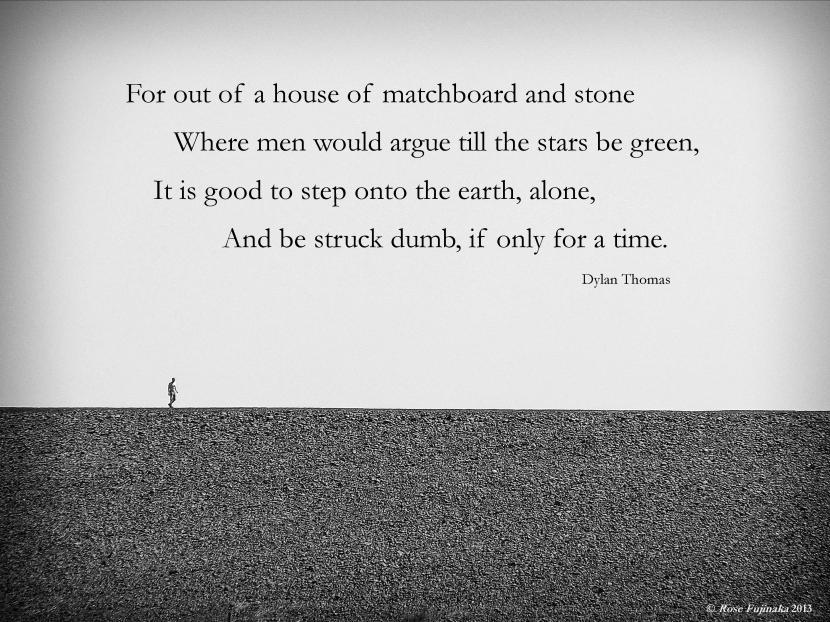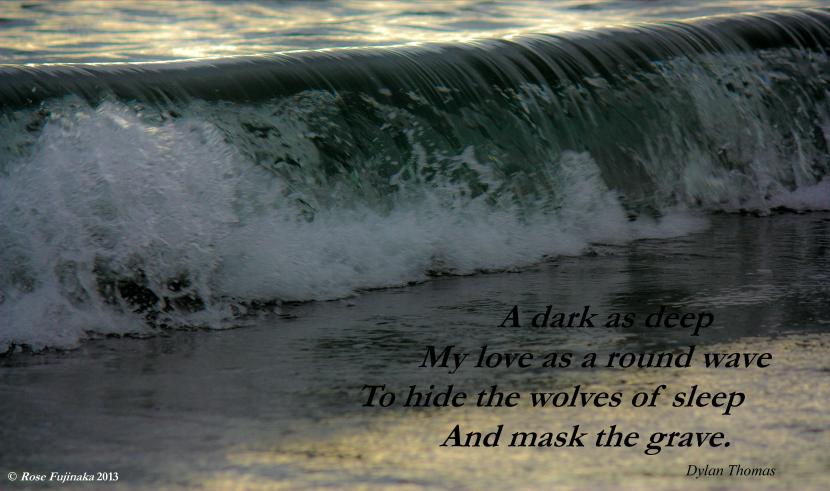The Poems of Dylan Thomas
 The Poems of Dylan Thomas, edited by Daniel Jones, 2/5
The Poems of Dylan Thomas, edited by Daniel Jones, 2/5
Dylan Thomas has opened my eyes to the subtleties inherent to the act of reading. For example, I used to think that I enjoyed reading. I now know better–what I actually enjoy is understanding what I read. Things I would enjoy reading more than the poems of Dylan Thomas include bathroom graffiti, YouTube comments, Wikipedia citations, heck, even dictionaries (complete ones–not any that Thomas has already mangled with scissors and glue, in search of inspiration).
I would have saved myself a lot of boredom and frustration had I only read the end notes first, where Jones excretes this particularly repellent drivel on the topic of Thomas’ notoriously indecipherable poem “Altarwise by owl-light”:
…the poem, in spite of its length, sustains a single metaphor, and it would be vain to seek in it logic, narration or message in the usual sense of these words, though they are all present metaphorically. Comprehension here is irrelevant, and to ‘translate’ the poetry into other words, to ‘interpret’ it in other thoughts, would be like straightening out the contours of a drawing and demonstrating its significance by measuring the result in inches (263).
I’ll tell you what else is present (and not metaphorically either)–bullshit. Now, I don’t go around art galleries with a tape measure, but after reading straight through 191 of Thomas’ poems, I’d be more than willing to demonstrate the significance of his drinking problem by calculating the number of beers he must have drunk in order to compose such intoxicated, nonsensical ramblings.
Don’t believe me? Please review Exhibit A–two 10-line excerpts from the book:
Excerpt 1
Because the pleasure-bird whistles after the hot wires,
Shall the blind horse sing sweeter?
Convenient bird and beast lie lodged to suffer
The supper and knives of a mood.
In the sniffed and poured snow on the tip of the tongue of the year
That clouts the spittle like bubbles with broken rooms,
An enamoured man alone by the twigs of his eyes, two fires,
Camped in the drug-white shower of nerves and food,
Savours the lick of the times through a deadly wood of hair
In a wind that plucked a goose…
Excerpt 2
His striped and noon maned tribe striding to holocaust,
Always good luck, praised the finned in the feather,
Grave men, near death who see with blinding sight
And the hewn coils of his trade perceives
Too proud to die, broken and blind he died.
And the gestures of unageing love
Flower, flower the people’s fusion,
And tells the page the empty ill.
There can be few tears left: Electra wept
Believe, believe and be saved, we cry, who have no faith…
One of these excerpts is from a single poem, the other is comprised of ten lines, drawn at random from ten different poems (with the ending punctuation changed on a few of the lines for “flow”). I’ll tell you which is which at the end of this post, just in case you wish to go back and give all that lovely metaphorical logic, narration and message another read-through before making your guess.
After two weeks of slogging, word by painful word, through the morass that is Thomas’ oeuvre, I feel entitled to rage, rage against the dying of my brain cells. However, I do realise that I am constitutionally unsuited to enjoy modern poetry. It took ten years for me to learn to appreciate unrhymed poetry and five more years to learn to enjoy some of it. Small wonder that I found little to like in this collection. The reason I did not give this book my lowest rating is because of my own aforementioned shortcomings with regard to modern poetry, the fact that I didn’t understand most of the book (so it’s difficult to give a reasoned opinion of it) and most importantly, that I did come across a few genuinely beautiful poems and ideas, glittering like gems amongst the ravings.
[Why I read it: since I am teaching myself Welsh and hope to visit Wales next year, I kept coming across references in my reading to Thomas, Wales’ most famous and celebrated poet.]
By the way, the first excerpt is unaltered, the second excerpt is random. Did you figure it out on your own? Leave a comment!







i studied “under milk wood” in high school, and apart from that, my knowledge of d.t. (appropriate initials!)’s poetry is “do not go gentle into that good night” … i had no idea his other output was so incoherent. i had harbored some vague notion that all would be redeemed by hearing it read aloud by richard burton, but now i’m not so sure.
i’m also not so sure about you, i’m afraid. slogging through 191 poems shows either an admirable persistence (“that something is difficult is reason more for us to do it”, thank you rilke) or is grounds for committal to the funny farm. i shall withhold judgment for the nonce.
thanks for an interesting post.
LikeLike
Lol, I bet Thomas never cut back on the alcohol enough to have The DTs, so that would be a deliciously ironic nickname! Yes, the number of poems in this collection that could be labeled “coherent” could probably be counted on one hand (or maybe two, but definitely no feet would be involved). Funny–I too have this strange feeling that hearing the poems read aloud would somehow make them more meaningful, though it would likely just be that the less crazy poems would be the ones most likely to be performed. However, I am so sick of Thomas that I just can’t be bothered to listen to any (though there are some recordings on YouTube, I think, so let me know if you listen to them). I recognised Richard Burton’s name, but didn’t know that he was Welsh until I looked him up. I wonder if he wrote any poetry…
I’m afraid the last two weeks have rather qualified me for the funny farm than anything… but I’m very pleased you enjoyed the post! It’s definitely time for some light reading…
LikeLike
Props for the inspirational poster gems… mined from what sounds to be gruesome prose.
LikeLike
Thanks! “Gruesome” is an excellent adjective in this case…
LikeLike